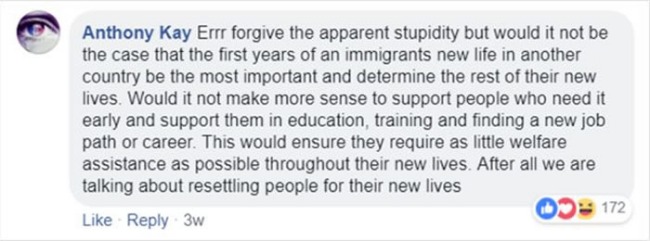As of July 1, government may extend the waiting time for new immigrants` benefits to four years, according to Australian television station 9.
The move was presented to Congress as part of the 2018 government budget plan. Once approved by Congress, more than 50000 immigrant families will be affected, including more than 110000 children.

In December 2017, Australia`s Federal government announced that all new immigrants would have to wait three years before applying for Centrelink-related benefits, with a view to saving $1.3 billion on federal government spending over the next four years.
According to the newly announced budget, the waiting period for benefits applications is extended to four years. Federal government savings as a result also further increased to A $1.5 billion.
As soon as the plan was announced, it was strongly opposed by immigration groups and social security agencies.
FECCA says government`s proposal could make the lives of many new migrants in distress worse off.
ACOSS (Australian Department of Social Security) also spoke in criticism of government`s claim, saying the policy "could hurt the most vulnerable groups."
Australian netizens have also expressed their views:
Some people think this makes sense because the welfare system comes from Australian taxpayers, and immigrants should wait longer to enjoy the benefits.

"immigrants come to this country voluntarily, and they should be prepared to be self-sufficient."
Some people think this idea is "stupid" because the first year of life for the average immigrant is the most difficult and yes, and government should help them when they need help most.

"shouldn`t government help immigrants in the first year of education, training and job hunting?"
Others say many migrants choose to emigrate not because they have a lot of money to be self-sufficient, but because they don`t see the future in their own country.

"they came here to create a better life for the family."
In the face of criticism, Australian Prime Minister David Turnbull said government would not apologize for keeping immigrants waiting for four years.
Mr Turnbull says immigrants should work before receiving state benefits. "they should work in this country until they are eligible for state welfare."
A spokesman for the government Department of Social Services said the move was designed to ensure that immigrants who came to the country for "economic reasons" understood that they should be fully prepared for self-sufficiency.
So what is the impact of the extension of immigration benefits on Australia`s immigrant communities?
comment on
1: extended waiting period or greater impact on Chinese
While the government`s extension of the waiting time for immigration benefits naturally has a negative impact on migrants, the impact of this policy is different for the categories of immigrant groups:
For those who rely on skilled migrants or employer-sponsored migrants, the first few years of migration should be the toughest. They are gradually adapting to Australian culture and life and to unfamiliar working environments. Their development in Australia may also be limited by language, so they may need more help from government and the community.
And for people who invest in immigrants, they can usually bear the costs of medical care, old-age care, and so on in previous years, so the impact is not big.
The effects of extended welfare waiting times on different families are also different. Some young families may just have children or mortgage, car pressure, more in need of welfare policy protection.
What cannot be ignored is that the impact of this proposition may also be different for immigrant groups of different cultural backgrounds:
Chinese and many other Asian ethnic groups have a culture that values family reunification. Many immigrants bring their parents to Australia after they emigrate, so that they can enjoy the benefits of Australia so that they can enjoy their old age.
In general, the elderly are more dependent on the health and pension benefits provided by the national system. Keeping them waiting for four years would no doubt mean that they would have to bear the high costs of medical care and old-age care, either personally or by their own children.

In short, the unbalanced government immigration welfare policy may further widen the gap between the rich and the poor and deepen the income gap between different groups.
Two: work first, then social security?
The government has taken a tough line on new immigration welfare policies, stressing repeatedly that immigrants need to work in Australia before they can enjoy the benefits of the country.
Many proponents also stressed that immigrants should first contribute to Australian society and then enjoy benefits, so that it is fair.
In other words, many people believe that immigrants are not "qualified" to receive dividends in the early stages of migration.
This claim is based on the assumption that new immigrants have not contributed to Australian society. But if we think about it carefully, we will find that this assumption is untenable.
Both employer-sponsored immigrants, skilled migrants and investment migrants have already spent a lot of human and financial resources when they emigrated.
Many have worked and lived in Australia for many years before formally gaining immigration status, not only paying taxes to government, but also contributing to local community building.
Now government`s "work first, then Social Security" negates their years of contribution, it`s chilling.

In fact, whatever excuses government makes, there is no way to hide the fact that government treats immigration as a cash cow.
From the beginning, immigration policy was regarded as a strategy used by the state to balance the domestic labour force.
When the country`s labor force is scarce, the government uses a loose immigration policy to attract labor, and when there is a surplus, the country uses a tight immigration policy to limit immigration. The utilitarian heart of this country has been followed since centuries ago.
In other words, even if immigrants are legally recognized as "citizens", it does not mean that immigrants are treated equally with other citizens.
This institutional bias is so deeply entrenched that it is no wonder that many immigrants laugh at themselves as "second-class citizens".
At present, Australia`s government wants to extend the waiting time for immigration benefits, which is tantamount to turning away when migrants are most in need of help. How can immigrants really think of themselves as part of this country when it comes to such indifference? How do you really love this country from your heart?
epilogue
Over the years, immigrants have made great contributions to Australia`s economy and society. It is chilling now that the government is cutting immigration benefits again.
Benefits cuts may save 200 million government budgets, but the resulting social costs are far less measurable. When will the "eligibility" of immigrants for state benefits disappear?

